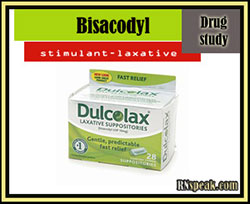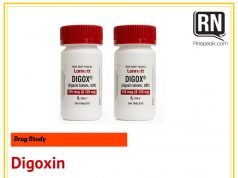 Generic Name:Bisacodyl
Generic Name:Bisacodyl
Brand Name:Apo-Bisacodyl , Bisacolax, Bisco-Lax , Dacodyl, Deficol, Dulcolax, Fleet Bisacodyl, Laxit , Theralax
Classifications: gastrointestinal agent; stimulant laxative
Pregnancy Category:C
Availability
5 mg tablets; 10 mg suppository
Actions
Expands intestinal fluid volume by increasing epithelial permeability.
Therapeutic effects
Induces peristaltic contractions by direct stimulation of sensory nerve endings in the colonic wall.
Uses
Temporary relief of acute constipation and for evacuation of colon before surgery, proctoscopic, sigmoidoscopic, and radiologic examinations. Also used to cleanse colon before delivery and to relieve constipation in patients with spinal cord damage.
Contraindications
Acute surgical abdomen, nausea, vomiting, abdominal cramps, intestinal obstruction, fecal impaction; use of rectal suppository in presence of anal or rectal fissures, ulcerated hemorrhoids, proctitis.
Cautious use
Safety during pregnancy (category C), lactation, or in children is not established.
Route & Dosage
Laxative
adult:PO 5–15 mg prn (max: 30 mg for special procedures)
PR 10 mg prn
child:PO >=6 y, 5–10 mg prn.
PR >=2 y, 10 mg; <2 y, 5 mg
Administration
Oral
- Give in the evening or before breakfast because of action time required.
- Give enteric coated tablets whole to avoid gastric irritation; do not cut or crush. Patient should not chew tablets. Preferably give with a full glass (240 mL) of water or other liquid.
- Do not give within 1 h of antacids or milk. These substances may cause premature dissolution of enteric coating; early release of drug in stomach may result in gastric irritation and loss of cathartic action.
- Store tablets in tightly closed containers at temperatures not exceeding 30° C (86° F).
Rectal
- Suppository may be inserted at time bowel movement is desired.
- Storage is same as tablets.
Adverse effects
other:Systemic effects not reported. Mild cramping, nausea, diarrhea, fluid and electrolyte disturbances (especially potassium and calcium).
Nursing implications
Assessment & Drug Effects
- Evaluate periodically patient’s need for continued use of drug; bisacodyl usually produces 1 or 2 soft formed stools daily.
- Monitor patients receiving concomitant anticoagulants. Indiscriminate use of laxatives results in decreased absorption of vitamin K.
Patient & Family Education
- Add high-fiber foods slowly to regular diet to avoid gas and diarrhea. Adequate fluid intake includes at least 6–8 glasses/d.
- Do not breast feed while taking this drug without consulting physician.







